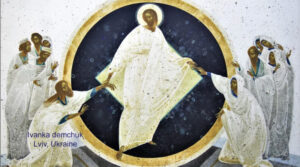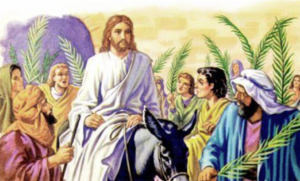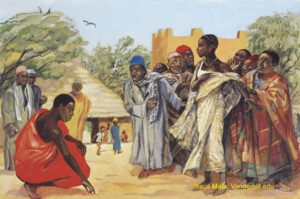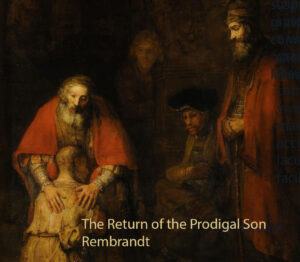“They came to Capernaum and . . . he began to ask them, ‘What were you arguing about on the way?’
But they remained silent. They had been discussing among themselves on the way who was the greatest.
“Then he sat down, called the Twelve, and said to them, ‘If anyone wishes to be first, he shall be the last of all and the servant of all.”’
Taking a child, he placed it in their midst, and putting his arms around it, he said to them,
‘Whoever receives one child such as this in my name, receives me; and whoever receives me, receives not me but the One who sent me.’” Mark 9: 30-37
+++++
Jesus is really telling his disciples (and us) that we have a tendency to let the “rat race” we live for six weekdays trap us. And that makes us miss seeing, let alone, connecting with people and with what is really happening around us. “Keeping holy the Lord’s Day” is not so much to please God as it is to allow ourselves to step aside from the “rat race” of life and be present, not only at Mass but throughout the day, to life itself – the life we share with God and with those around us!
 This reminds me of Xavier Le Pichon, one of the world’s leading geophysicists who helped create the field of plate tectonics. In 1973, at the height of his career, he recognized that he was so absorbed in his work that he quit his job in France to spend six weeks in Calcutta holding a dying, starving boy, feeding him and, more importantly, learning to “see” him, to grow to love him. That experience opened himself to experience life in the midst of daily living rather than just running from one activity to the next. Mr. Le Pichon describes what happened to him:
This reminds me of Xavier Le Pichon, one of the world’s leading geophysicists who helped create the field of plate tectonics. In 1973, at the height of his career, he recognized that he was so absorbed in his work that he quit his job in France to spend six weeks in Calcutta holding a dying, starving boy, feeding him and, more importantly, learning to “see” him, to grow to love him. That experience opened himself to experience life in the midst of daily living rather than just running from one activity to the next. Mr. Le Pichon describes what happened to him:
“I was working with the dying people and I had the ‘meeting with’ a small boy while giving food to this child who was dying of hunger. He was at the last stages. Suddenly, I had this experience that is, to me, the founding experience of humanity, which is discovering through empathy that you really are one with the man who is suffering. You identify yourself with this person, and this can be so strong. So I made, at the time, the promise to the small child that I will try, from now on, not to ever turn away my eyes from somebody who is suffering. And that was a turning point in my life.”
Does each of us need a similar “time out” experience right now? If so, sit back and listen to Fragility and the Evolution of Our Humanity, a 2009 interview of Mr. Le Pichon by Krista Tippett, host of On Being. In the interview they discuss Mr. Le Pichon’s perspective on the meaning of humanity which Ms. Tippett calls a “perspective equally informed by his scientific and personal encounters with fragility as a fundament of vital, evolving systems,” adding that “Le Pichon has come to think of caring attention to weakness as an essential quality that allowed humanity to evolve.”
Click here to either Play the Fragility and the Evolution of Our Humanity Edisode or to read the transcript of the Episode. (Click on the PLAY EPISODE to the right of the photo at the top of the page.)
Some quotes from the interview:
“My heart cannot be educated by myself. It can only come out of relationship with others. And if we accept to be educated by the others, to let the other explain to us what happens to them, how they feel, which is completely different from what we feel, and to let yourself immerse into their world so that they can get into our world, then you begin to share something which is very deep.”
“. . . this is the mystery that Jesus has asked us to get into, which is the mystery of the neighbor who is suffering. He doesn’t give a direct clue about what’s going to happen. But he tells us, “Look, try. Try to go to them and to live with them and see what happens, how your life is going to be changed.” This is what I’ve been doing. And I’ve progressively discovered that this was the essence of his message — that God is mercy, and God can be found only in the measure in which you enter in this deep companionship with those that he loves best because they need him most, which are the people having deep suffering. ”
On evolution: “I find that the thing that God obviously has given us is the faculty to evolve with the whole world. In other words, he gave us a creation which is not finalized, and we have in our hands the possibility to finalize it. And he shows us that everything is not arbitrary. It’s not something that — he created some species of animals, some species of plants, and so on once indefinitely. And he did it, and that’s it. No.
“He puts the system in root, and he lets it evolve. He is there. He supports it, but he does not arbitrarily change the law all the time. It’s an understandable system. It’s a system that is given to us. And I find it extremely interesting and beautiful to discover how he has prepared all this possibility we have in us through the evolution.”
Sister Loretta Fernandez RSM




